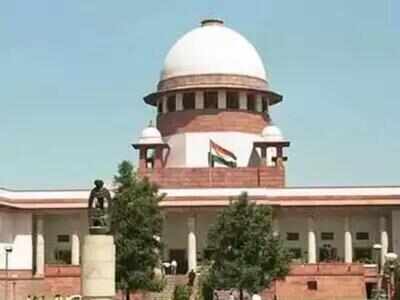Top Searches
- News
- India News
- SC chastises several states for not replying on judges’ security
SC chastises several states for not replying on judges’ security

NEW DELHI: The Supreme Court on Tuesday read the riot act to some states —Maharashtra, West Bengal, Andhra Pradesh, Tamil Nadu and Kerala— for disregarding the deadline to file affidavits detailing security measures for judges and courts and imposed Rs 1 lakh cost on each while warning that their chief secretaries would be summoned if responses are not filed in 10 days.
In the matter taken up suo motu after the alleged killing of Dhanbad additional district judge last month, a bench of Chief Justice N V Ramana and Justices Surya Kant and Aniruddha Bose was told by Solicitor General Tushar Mehta that despite SC’s direction to states to either file affidavits by August 17 or forfeit their right to reply, most have not submitted their response and worse, many are unrepresented before the court during the hearing on a very important issue about security and safety of judges and court complexes.
Refusing to condone the states’ disrespect to the court order, the bench in its order said, “The states which have not filed their counter affidavits so far shall also file the same within a period of 10 days from today, subject to deposit of costs of Rs 1 lakh with the Supreme Court Bar Association Advocates’ Welfare Fund, failing which we would be compelled to seek the presence of the chief secretaries of the states concerned.”
The SC asked the Centre whether it was considering creation of a special force, on the lines of Railway Protection Force or Central Industrial Security Force, for giving security to judges and court complexes. Mehta said law and order being a state subject, it would be better to leave creation of a special unit for protection of judiciary and judges to state police in accordance with the 2007 detailed guidelines issued by the ministry of home affairs.
The SC asked why has the Centre not been able to get its guidelines implemented to prevent repeated attacks on judges, litigants and lawyers. The SG said he would advise the Union home secretary to expeditiously call for a meeting of either the state home secretaries or DGPs for speedy implementation of the guidelines.
In the matter taken up suo motu after the alleged killing of Dhanbad additional district judge last month, a bench of Chief Justice N V Ramana and Justices Surya Kant and Aniruddha Bose was told by Solicitor General Tushar Mehta that despite SC’s direction to states to either file affidavits by August 17 or forfeit their right to reply, most have not submitted their response and worse, many are unrepresented before the court during the hearing on a very important issue about security and safety of judges and court complexes.
Refusing to condone the states’ disrespect to the court order, the bench in its order said, “The states which have not filed their counter affidavits so far shall also file the same within a period of 10 days from today, subject to deposit of costs of Rs 1 lakh with the Supreme Court Bar Association Advocates’ Welfare Fund, failing which we would be compelled to seek the presence of the chief secretaries of the states concerned.”
The SC asked the Centre whether it was considering creation of a special force, on the lines of Railway Protection Force or Central Industrial Security Force, for giving security to judges and court complexes. Mehta said law and order being a state subject, it would be better to leave creation of a special unit for protection of judiciary and judges to state police in accordance with the 2007 detailed guidelines issued by the ministry of home affairs.
The SC asked why has the Centre not been able to get its guidelines implemented to prevent repeated attacks on judges, litigants and lawyers. The SG said he would advise the Union home secretary to expeditiously call for a meeting of either the state home secretaries or DGPs for speedy implementation of the guidelines.
FacebookTwitterLinkedinEMail
Start a Conversation
end of article
Quick Links
Coronavirus in MumbaiFarm bill 2020Farmers protestCoronavirus in DelhiCoronavirus in BangaloreCoronavirus symptomsCoronavirus in IndiaWest Bengal elections 2021Coronavirus NewsSolar EclipseNPRWhat is NRCCAB BillCAB and NRCAssam election 2021Podcast newsLok SabhaTamil Nadu Election 2021CongressBJP newsKerala Elections 2021Indian ArmyISRO newsSupreme Court

